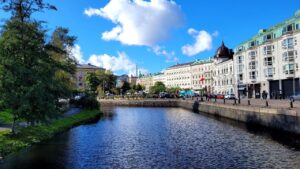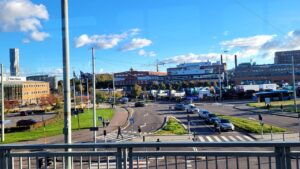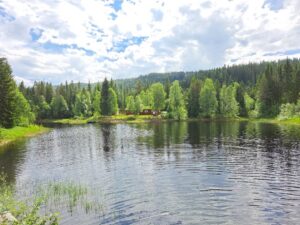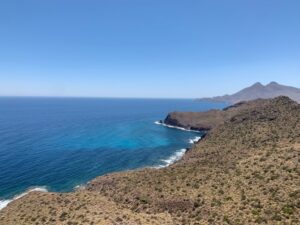Schlagwort: ‘energy engineering’
My experiences at Volvo Technology
- Energy Engineering M.Sc.
- Sweden, Göteborg
- Volvo Technology
- 10/2024 – 05/2025

Masthugget Church Viewpoint East ©Marc Müllenbach
Hello, my name is Marc. I am a German studying Master Energy Engineering at RWTH Aachen University, Germany, and participated in a research stay funded by the Erasmus+ Internship program during my master’s thesis at Volvo Technology – one of the most Swedish companies imaginable – in the second largest city Göteborg, Sweden. Getting this opportunity, to work on practical research in a company, was very difficult and almost did not work out. I started applying more than a year ahead, but this was way too early for most cases. In Sweden, there are no mandatory internships of up to 6 months; Swedish students gain practical experience during their summer break. Yes, you heard right: all students have a 2-3 month study-free period during the summer, without the need to prepare for exams, since they finish them before Midsommar (the summer solstice). Their internship culture comes from the fact that students do not receive their student funding during vacation, so many rely on summer jobs to survive financially until the next study period. Because internships are limited to these three months, companies don’t know about longer internships, especially not outside this period, as is common in Germany. Another aspect is that thesis work usually starts in January, as Swedish studies are separated into four periods, and are mainly carried out in groups of two—eliminating most chances if you want to start according to the German semester dates and alone. However, you would not be reading this if I hadn’t made it despite the low chances. I applied a lot, sent unsolicited applications to companies, connected with people on LinkedIn, and sent dozens of requests for an internship with the opportunity to follow up with a master’s thesis, which is usually the catch in Germany. The position was acquired via an unsolicited application to an industrial PhD student in cooperation between Chalmers University of Technology and Volvo Group, which led to the position at Volvo Technology. Other research internships would have been possible at Chalmers, but the research topic and work environment at Volvo were the best option.

Moat of the old city fortifications, Bazarbron ©Marc Müllenbach
Finding a suitable accommodation without being registered as a Swedish student brings further problems, since you are not eligible for student accommodations. Some shared living opportunities always exist but are highly requested and not available in sufficient quantity. Some international students even live in hotels or cabins for the first year. In Swedish metropolitan areas, housing agencies require you to be in the queue for several years. Even colleagues at my workplace, who were in the queue for up to three years, were not able to find suitable accommodation (for their living standard) and ended up buying instead. I found mine with a lot of luck on Facebook (which is widely used in Scandinavia and also serves as an online marketplace and for international exchange). The accommodation had two rooms, one bedroom, and one living room/kitchen. The monthly costs were approximately €450 per person, with all additional costs included. I lived there with my girlfriend, who also studied at Göteborg University. For grocery shopping, I highly recommend using “Too Good To Go,” which offers a full bag of vegetables close to expiration for under €5—this saves money since vegetables and fruits are noticeably more expensive compared to Germany. Monthly expenses for groceries were roughly €200 per person, including all food and household costs and eating out every two weeks. Since the canteen at Chalmers was €6 (student) or €8 (visitor), and at Volvo Group €10, I decided to always prepare my own food, which is popular in Sweden. There are always spaces with microwaves and cutlery. For transportation, you can use rental bikes for €30 per year (Nextbike/Sty&Ställ). Since I needed to get to the other side of the harbor to Göteborg Lundby, I bought a tram ticket, which was €60 (student) or €75 (non-student) per month. Even though I was a student, I couldn’t use the student discount for many occasions, since in Sweden your student status is verified by a “Mecenat” app account issued by a Swedish university, which I did not have.

Volvo Group, Gropegårdsgatan 10 ©Marc Müllenbach
Everyday life during the research stay was a 40-hour workweek, starting at 9:00 and ending at 17:00. It is common to have a one-hour lunch break at 11:00, which I always spent with coworkers. Since I started in October, I was the only student at the company until January, when two other thesis workers joined, as is usual during this time. From Volvo, I received a laptop for my research work, which was mainly self-guided and supervised by weekly meetings with my supervisor. I highly enjoyed short coffee breaks with colleagues around 14:00-15:00, called “fika,” to discuss technical topics or daily life. There was one 30-minute fixed slot per week where the whole department met, and one colleague always brought sweet pastries or cake. The department worked great as a team, and I think this weekly contact, as well as spontaneous meetings on other days, helps with teambuilding. I also enjoyed that Volvo Group is an international environment, and you can get into contact with everyone on a casual basis since in Sweden you always call people by their first name; titles and positions do not mainly define your personality.

Vrångö Island ©Marc Müllenbach
During the winter, I came home from work when it was already dark, but there are many options available. Monthly sports membership at “Fysiken” cost €33 per month (3-month period) for students, including gym, courses, team play, and climbing/bouldering. I used to go every second day and made friends during climbing and basketball. It seems much easier to make international friends, as Swedish students usually already have their friend groups. Getting into those groups takes time and is comparable to making friends in Germany. With friends found that way, at the company or through international university programs such as ESN, you will definitely find people to spend time with—though more likely internationals who will leave after six months. However, Göteborg is a city where you can spend your time at many places, such as bars with after-work discounts and pub quizzes, museums, or at the ice hockey arena watching “Frölunda HC.” Around February, you will get home when it is still bright outside and can spend the sunset at famous places such as “Skansen Kronan.” On weekends, I recommend visiting the local historical
amusement park “Liseberg,” the islands in the archipelago near Gothenburg, one of the beaches, or hiking around lakes such as “Delsjön.” Trips around Sweden to Stockholm, Malmö, Helsingborg, or even Oslo in Norway are easy to do on a small budget. ESN also offered a one-week trip to Swedish Lapland, which everyone recommended to me, but I was quite
occupied by research work and also took vacation to visit my family over Christmas.
In conclusion, I liked Swedish culture before, and this trip increased its attraction. Sometimes it was tough to receive the same rights as locals, since you always need digital proof such as Swedish student status (“Mecenat”). For foreigners, it is also impossible to buy at a local food market or farm since “Swish,” the Swedish version of PayPal for payment, requires a Coordination Number for a Swedish ID, a Swedish bank account, and BankID. There are also several special days with traditions such as St. Lucia around Christmas, Valborg/Walpurgis Night and Swedish National Day in spring, and Midsommar in summer. However, my girlfriend and I decided to continue our time in Sweden and enjoy one or more summers at the coast and in nature, where Sweden has much to offer.
Writing my Master Thesis in Trondheim
- Energy Engineering M. Sc.
- Norway, Trondheim
- Norges Teknisk-Naturvitenskapelige Universitet
- 01/2024-06/2024
Application / Finding an internship
To make new experiences and broaden my horizon I wanted to finish my academic studies with a stay abroad. So, I decided to do my master thesis in another country. I already had a research topic in mind and knew I wanted to go to another European country, thus I came across the NTNU in Trondheim, Norway – a place which seemed to be popular among engineering students from RWTH Aachen University. I did not apply for an advertised thesis, instead I had to demarcate the topic together with both my Norwegian supervisor and my German supervisor. Yet, the application process was surprisingly straightforward. I wrote an e-mail to the corresponding professor at NTNU, and he replied with a few hours and accepted my proposal. Additionally, I had to register myself as an exchange student at NTNU. The university’s international office was very supportive in that process. A benefit as an exchange student is that you are exempt from paying the semester fee.
Accommodation & living expenses
Since my stay in Trondheim was aligned with the Norwegian spring semester (January – June) I was given the chance to live in the Moholt student village (dorm). I can highly recommend Moholt to any exchange student because it makes your stay in Trondheim so much more enjoyable. First of all, the dorm rooms are very modern and well equipped. I lived in a 4-bedroom-apartment with three other students with shared kitchen and bathroom. The apartment had two big fridges, an oven with induction cooktop and a microwave – so well suited for cooking with friends. One big disadvantage is that the personal (bed)rooms are not equipped with a mattress. You either have to buy a new one (there is a furniture store right across the street) or get one from students who are leaving (there are Facebook and WhatsApp groups to organize buying and selling used stuff). Furthermore, there is a thing called Re:Store at Moholt where you can get used furniture and other household items for free which where donated by other students. In return, you can donate your used stuff when you leave. In case you need outdoor/hiking/sports equipment, you can go to the Bumerang store (also located at Moholt) where you can lend almost everything needed for outdoor activities (backpacks, skis, tents, …) without cost.
However, the best part of Moholt in my opinion is the Loftet. The Loftet is a common room located in the center of the village opened every day. It is equipped with tables where you can work as well as a lot of sofas where you can just relax. You can get a free cup of coffee or tea, pick one of a great variety of board games or play table tennis or video games on a PS5. The Loftet is run by very friendly volunteering students who work for Sit (the welfare organization for students) and can help you with almost anything. There are several recurring events, such as movie nights, quizzes, jam sessions, guided hiking tours etc. So, when you don’t know what to do – just go to the Loftet. The chances you’ll meet new interesting people and be involved in funny activities are quite high. It’s worth mentioning that the community at Moholt is very international.
Regarding the cost of living, the amount of money provided by the ERASMUS+ scholarship (750 €) was sufficient. The rent was approximately 400 euros (costs for internet and electricity are included). A six-months-ticket for the public transport costs about 250 euros. The food prices are extremely high compared to most other European countries. Especially basic groceries (water, milk, butter, cheese, vegetables) cost twice as much as in Germany. What’s also expensive is any close contact service, e.g. eating at a restaurant or going to the barber. Yet, if you are person who basically spends his or her money only (or mainly) on necessary things (groceries, toiletries, stationery, …) you will get along well with 750 € a month. If, on the other hand, you like to get take-away food often, go to clubs, bars, cinemas weekly, enjoy frequent shopping trips or have an expensive hobby, you might exceed the monthly stipend.
Everyday life / the internship
Paying bills in Norway works (almost) completely cashless. I have never held a Norwegian bank note in my hand, credit cards (or NFC-enabled smartphones) are accepted basically everywhere. Therefore, you should get a credit card that doesn’t charge fees for paying in foreign currency. Alternatively, you can link your PayPal account with Google Wallet. By doing that you also avoid those extra fees. Most Norwegians are fluent in English which makes communicating in everyday life very easy.
Since Trondheim is located quite northern on the globe the transition period from winter to summer is quite short. When I arrived in January the temperature was -13°C in the evening. There was a lot of snow until the beginning of April and the sun set very early (before 4:30 pm). Though from mid-April on there was a rapid change and in May temperatures sometimes went beyond 25°C and the sun did not set before 11 pm. So even when you finished working late, you could enjoy some hours of free time outside.
Working on my thesis was difficult in the first few weeks (and months to be honest). Since I had not applied for an advertised thesis a major, time-consuming part of my stay at NTNU was to formulate a research question which was relevant to both ‘sides’ (German and Norwegian). My Norwegian supervisor was actually the professor himself, who obviously has a tighter schedule than research assistants, which is why I did not meet him every week. The NTNU provides open offices at the campus particularly reserved for students. Unfortunately, the university cafeterias are extremely expensive (a meal costs 3-4 times as much as in Germany) which is why I worked from ‘home’ most of the time so that I was able to cook my own lunch.
Free time / tips

© Nils Baur
When you stay in Norway for a longer period, it is definitely worth experiencing the beautiful nature of the country. A great way to do that is going on a hike and staying overnight in one of the many cabins which NTNU owns. The cabins are neither equipped with electricity nor running water, to keep it warm you chop some wood and put it into the oven that is present in every cabin. Anything else – food, drinks, sleeping bags etc. – you must bring yourself. Although this may sound a little scary at the beginning, it really offers a cool and unique experience. Some cabins are located on a lake, some come with a sauna and above all you get a great view of the landscape.
From my experience, one might feel a little overwhelmed at first by all the opportunities to spend your free time. A good strategy is to start by joining the trips guided by the Sit students (starting at Loftet) to find out what kind of trip or activity suits you.
With the regard to writing a master thesis abroad, I’d recommend the following:
1) Align your stay in Norway with the semester cycle. That allows you to get a place in one of the student villages with all the benefits mentioned above.
2) If possible, find an advertised thesis with a (more or less) predefined research question. That will reduce the amount of required communication and coordination between your internal (your home university) and external (Norwegian) supervisor.
3) Draft a schedule for the different tasks of your thesis together with your supervisors. Think about what input you need from which supervisor (internal or external).
4) If you’re stuck at some point, don’t be afraid to ask your supervisor for help.
Conclusion
Trondheim is a great place to study. The people I have met there were extremely friendly without exception. The student welfare organization Sit provides a very comfortable living environment. It is important to take care of administrative stuff early enough (finding a topic and a supervisor, register as an exchange student, find housing, apply for ERASMUS funding, get adequate insurance). Yet, if you are facing problems during your stay there are many people and institutions who can help you. Personally, I would do some things differently in retrospect, nevertheless, I am very grateful for having made the experience.
Writing my master’s thesis in Almería, Spain
- Energy Engineering M.Sc.
- Spain, Almería
- German Aerospace Center (DLR)
- March 2022 – August 2022
The Institute for Solar Research, which is part of the German Aerospace Center (DLR), maintains a research site in Almería in the south of Spain. I spent six months at this location to write my master’s thesis.
Preparation and general tips:
I applied for the master’s thesis in November 2021 and received an invitation to an online meeting with my supervisor quite quickly. After I had the acceptance and we agreed on a topic, I applied for the Erasmus scholarship in January 2022. In February 2022, I booked my flight and started looking for an apartment. The apartments and shared rooms in Almería are cheaper compared to Germany. I found my apartment through “idealista” and had support from people who also worked at DLR and already lived in Almería. Since you can find an apartment quickly, you can also move into a hostel for the first few days and start looking locally.
I recommend looking for an accommodation in the Centro (near the bars and restaurants) or in Zapillo (near the beach), because you can get everywhere quite quickly from there. Most of the landlords do not speak English, so you should write your requests on “idealista” in Spanish. From a language course, I already knew some basics in Spanish, but I mostly got by with an online translator. Also, if you start at DLR, make sure you get a rental contract, as you will need it for later registration with the authorities.
Job and everyday life:
Some students had to take the bus to the Plataforma Solar de Almería (PSA) in Tabernas (about 45 minutes). I worked in the office in the center of Almería. It is surrounded by many different tapas bars and restaurants. We made use of this with the colleagues and usually went out during our lunch break. Eating tapas in Almería is comparatively inexpensive.
In the office we communicated in German or in English. In everyday life, however, you need Spanish, because most of the local people do not speak English. Thus, one learns the most important basics quite quickly. If that’s not enough, you can take a language course (there are several language schools in Almería) or participate in the events of the Erasmus Office to find a language buddy.
Almería is a small town but has everything to offer what you need. Plenty of supermarkets, a nightlife and larger shopping centers a little outside. The university is also located a bit outside but is easily accessible by bus. Almería has an airport, but unfortunately there are no direct flights from Germany.
Leisure:

© Rafal Broda
The weather in Almería is great. After work, I often met up with my colleagues from DLR, my roommates or other Erasmus students. We usually met on the beach to play beach volleyball. In the evenings, you can go out for tapas in Almería or go dancing in one of the music bars. I have found that it is quite difficult to socialize with local people, mainly because of the language barrier, but since there are a lot of international students coming to the university, it is overall quite easy to make new contacts. On some weekends we made trips to the nearby nature park Cabo de Gata. There you can hike, snorkel or just relax on one of the many beautiful beaches. I can highly recommend a visit there. On long weekends, you can also take a trip of several days to Granada or Seville to explore Andalusia a bit. From Almería, you can also take a ferry to Morocco. If you are interested, remember to bring your passport.
Conclusion:
Overall, I had a very nice time in Almería. I can definitely recommend doing an internship or thesis at the Institute of Solar Research in Almería. I experienced a lot during this time, met many nice people and improved my Spanish.

